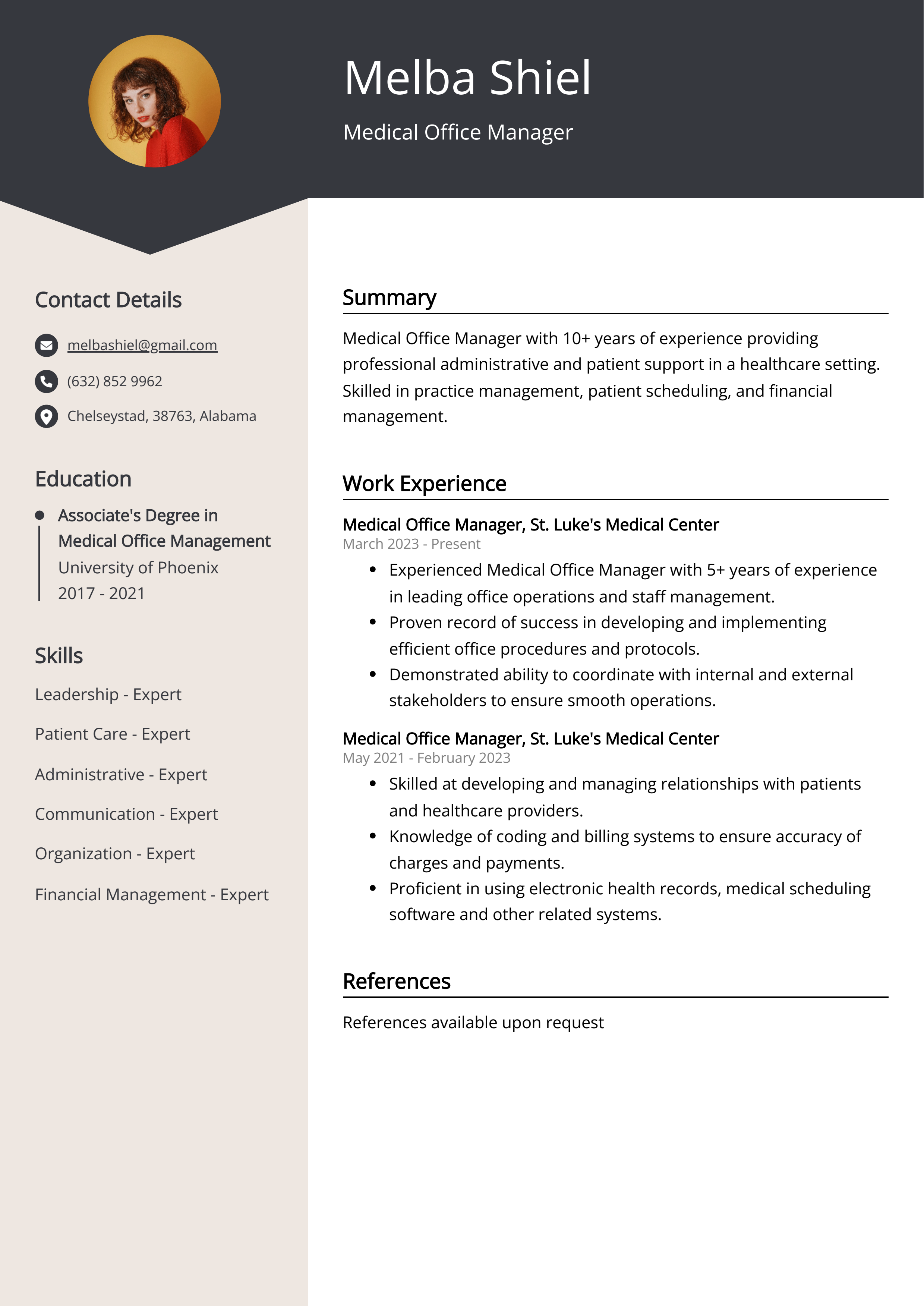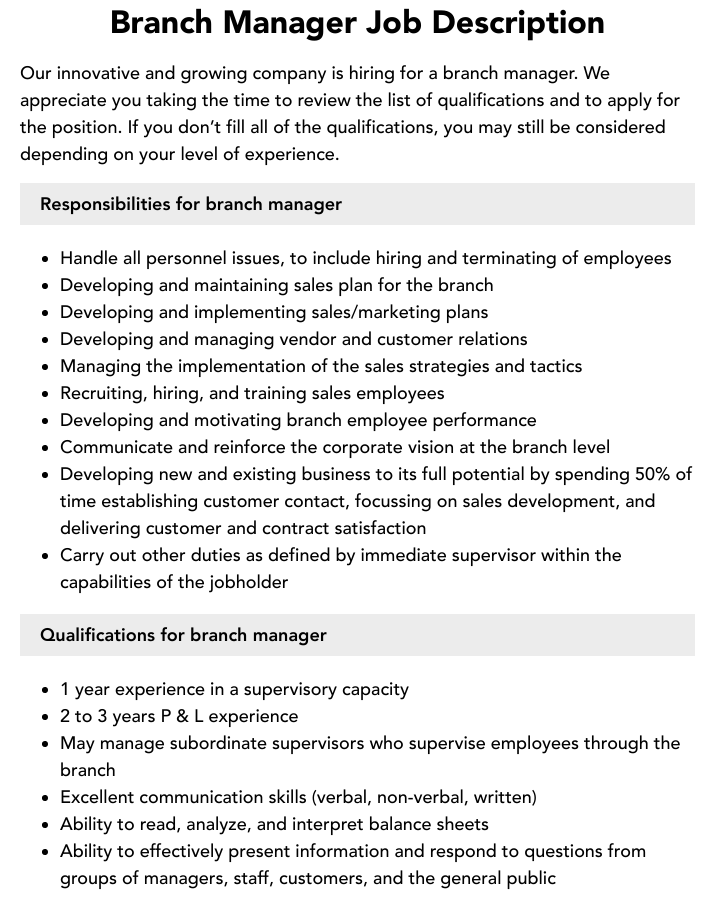
A medical office manager job description outlines the duties, responsibilities, and qualifications required for this role within a medical office. It serves as a guide for hiring managers and candidates alike, ensuring that expectations are clearly defined.
Medical office managers play a crucial role in the smooth functioning of a medical practice. They are responsible for overseeing the day-to-day operations, including managing staff, finances, and patient care. Effective medical office managers possess a combination of administrative, financial, and healthcare knowledge, enabling them to navigate the complexities of the healthcare industry.
The duties of a medical office manager typically include:
- Managing staff, including hiring, training, and performance evaluations
- Overseeing the financial aspects of the practice, including billing, insurance, and payroll
- Ensuring compliance with healthcare regulations and standards
- Maintaining patient records and ensuring patient satisfaction
- Working closely with physicians and other healthcare providers
Medical office managers must possess a strong understanding of medical terminology, insurance billing practices, and human resources management. They must also be able to effectively communicate with patients, staff, and physicians. With their comprehensive skill set, medical office managers contribute to the overall success and efficiency of a medical practice.
1. Administration
Administration is a crucial aspect of a medical office manager’s job description, encompassing the day-to-day operations that ensure the smooth functioning of the practice. It involves managing staff, finances, and patient care, each of which plays a vital role in the overall success of the office.
- Staff Management: Medical office managers are responsible for overseeing the staff, including hiring, training, and performance evaluations. They ensure that the staff is adequately trained and motivated to provide excellent patient care.
- Financial Management: Medical office managers handle the financial aspects of the practice, such as billing, insurance, and payroll. They ensure that the practice is financially stable and compliant with all applicable regulations.
- Patient Care Management: Medical office managers are responsible for ensuring that patients receive high-quality care. They oversee the patient intake process, schedule appointments, and coordinate care with physicians and other healthcare providers.
Effective administration is essential for the success of any medical office. By managing staff, finances, and patient care effectively, medical office managers create a positive and productive work environment that ultimately leads to better patient outcomes.
2. Finance
Financial management is a critical component of the medical office manager job description. Medical office managers are responsible for overseeing the financial aspects of the practice, including billing, insurance, and payroll. They must ensure that the practice is financially stable and compliant with all applicable regulations.
Effective financial management is essential for the success of any medical office. By managing the financial aspects of the practice effectively, medical office managers can help to ensure that the practice is able to provide high-quality patient care. They can also help to protect the practice from financial risks.
Here are some of the key challenges that medical office managers face in managing the financial aspects of their practices:
- Maintaining a positive cash flow: Medical office managers must ensure that the practice has enough cash on hand to meet its financial obligations, such as paying salaries, rent, and supplies.
- Managing accounts receivable: Medical office managers must track and collect payments from patients and insurance companies.
- Complying with insurance regulations: Medical office managers must be familiar with the complex regulations governing insurance billing and reimbursement.
- Protecting the practice from fraud: Medical office managers must be aware of the risks of fraud and take steps to protect the practice from financial loss.
Medical office managers who are able to meet these challenges effectively can help to ensure the financial success of their practices. They can also help to protect the practice from financial risks and ensure that the practice is able to provide high-quality patient care.
3. Compliance
Compliance is an essential aspect of the medical office manager job description. Medical office managers are responsible for ensuring that their practice adheres to all applicable healthcare regulations and standards. They must also maintain patient confidentiality and protect patient health information.
- HIPAA Compliance: The Health Insurance Portability and Accountability Act (HIPAA) is a federal law that protects the privacy of patient health information. Medical office managers must be familiar with HIPAA regulations and implement policies and procedures to ensure that the practice is compliant.
- Medicare and Medicaid Compliance: Medical office managers must be familiar with the regulations governing Medicare and Medicaid reimbursement. They must also ensure that the practice is compliant with all applicable billing and coding requirements.
- OSHA Compliance: The Occupational Safety and Health Administration (OSHA) is a federal agency that regulates workplace safety and health. Medical office managers must be familiar with OSHA regulations and implement policies and procedures to ensure that the practice is compliant.
- State and Local Regulations: Medical office managers must also be familiar with state and local healthcare regulations. These regulations may vary from state to state, so it is important for medical office managers to stay up-to-date on the latest changes.
By ensuring that their practice is compliant with all applicable healthcare regulations and standards, medical office managers can help to protect the practice from legal and financial risks. They can also help to ensure that the practice is providing high-quality patient care.
4. Communication
Effective communication is a vital component of the medical office manager job description. Medical office managers must be able to communicate effectively with patients, staff, and physicians, both verbally and in writing. This is essential for ensuring that patients receive the care they need, that staff is well-informed and motivated, and that physicians have the information they need to make informed decisions about patient care.
There are many different ways that medical office managers can communicate effectively. Verbal communication includes face-to-face conversations, phone calls, and video conferencing. Written communication includes emails, letters, and reports. Medical office managers must be able to use both verbal and written communication effectively to be successful in their roles.
Here are some tips for effective communication in a medical office setting:
- Be clear and concise.
- Be respectful and professional.
- Be mindful of your body language and tone of voice.
- Be an active listener.
- Be willing to communicate in a variety of ways.
By following these tips, medical office managers can create a positive and productive work environment where everyone is able to communicate effectively.
5. Leadership
Leadership is a critical component of the medical office manager job description. Medical office managers are responsible for providing guidance and support to their staff, and for fostering a positive and productive work environment. This is essential for ensuring that the practice runs smoothly and efficiently, and that patients receive the best possible care.
-
Providing guidance and support to staff
Medical office managers are responsible for providing guidance and support to their staff on a daily basis. This includes providing clear instructions on how to perform tasks, answering questions, and providing feedback. Medical office managers must also be able to support their staff through difficult times, such as when they are dealing with a difficult patient or when they are feeling overwhelmed. -
Fostering a positive and productive work environment
Medical office managers are responsible for creating a positive and productive work environment for their staff. This includes creating a culture of respect and trust, and providing opportunities for staff to learn and grow. Medical office managers must also be able to resolve conflicts and disputes in a fair and impartial manner.
By providing guidance and support to their staff, and by fostering a positive and productive work environment, medical office managers can help to ensure that their practice runs smoothly and efficiently, and that patients receive the best possible care.
FAQs
This section provides answers to frequently asked questions about the medical office manager job description, offering valuable insights into the role’s responsibilities, qualifications, and career path.
Question 1: What are the primary responsibilities of a medical office manager?
Answer: Medical office managers oversee the day-to-day operations of a medical practice, including managing staff, finances, and patient care. They ensure the smooth functioning of the office and the provision of high-quality healthcare services.
Question 2: What qualifications are typically required for this role?
Answer: Candidates typically possess a bachelor’s degree in healthcare administration or a related field, along with several years of experience in a medical office setting. Strong organizational, communication, and leadership skills are essential.
Question 3: What is the career path for medical office managers?
Answer: With experience and additional qualifications, medical office managers can advance to roles such as practice manager, operations manager, or healthcare administrator. Some may also pursue further education to obtain a master’s degree in healthcare administration.
Question 4: What are the key challenges faced by medical office managers?
Answer: Common challenges include managing financial constraints, complying with regulations, implementing new technologies, and addressing staff shortages. Effective medical office managers find innovative solutions to overcome these hurdles.
Question 5: What are the essential qualities of a successful medical office manager?
Answer: Successful medical office managers are highly organized, detail-oriented, and possess excellent communication and interpersonal skills. They are also adaptable, proactive, and committed to providing exceptional patient care.
Question 6: How can I prepare for a medical office manager interview?
Answer: Research the organization, practice answering common interview questions, highlight your relevant skills and experience, and prepare questions to ask the interviewer. Confidence, professionalism, and a genuine interest in the role can increase your chances of success.
Summary: The medical office manager job description encompasses a wide range of responsibilities that contribute to the success of a medical practice. By understanding the role’s requirements, qualifications, and challenges, individuals can make informed career decisions and prepare effectively for the job market.
Transition: This comprehensive overview of the medical office manager job description provides a solid foundation for further exploration of the role’s importance and benefits.
Tips for Medical Office Manager Job Description
A well-crafted medical office manager job description is crucial for attracting qualified candidates and ensuring a successful hiring process. Here are some tips to consider:
Tip 1: Clearly Define Responsibilities
Outline the specific duties and responsibilities of the medical office manager, including administrative tasks, financial management, patient care coordination, and staff supervision.
Tip 2: Specify Qualifications and Experience
State the required education, certifications, and years of experience necessary for the role. Clearly mention any preferred skills or knowledge, such as proficiency in medical software or healthcare regulations.
Tip 3: Highlight Key Competencies
Identify the essential competencies for the position, such as strong organizational abilities, excellent communication skills, and the ability to manage multiple priorities effectively.
Tip 4: Include Salary and Benefits Information
If possible, provide a salary range and details of the benefits package to attract potential candidates and demonstrate the organization’s commitment to fair compensation.
Tip 5: Use Clear and Concise Language
Write the job description using clear and concise language that is easy to understand. Avoid using technical jargon or ambiguous terms that may confuse applicants.
Summary: By following these tips, medical practices can create effective job descriptions that accurately represent the role of the medical office manager, attract qualified candidates, and streamline the hiring process.
Transition: These tips contribute to a comprehensive understanding of the medical office manager job description, highlighting its importance in attracting and securing talented individuals for this critical role within the healthcare industry.



